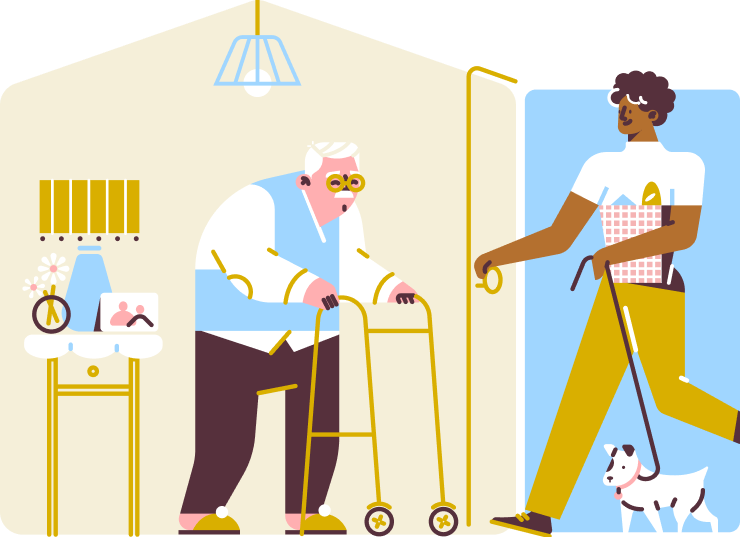Digital literacy is a key cross-cutting skill which means being able to use digital technology critically, collaboratively and creatively. Digital skills will be contextualised with the target groups in the senior care professions. They will choose the situations in which they use this skill in their daily work. The DigComp work reference was designed to be a source of inspiration and to be adapted according to the objectives, target groups, operational conditions and available resources. It is therefore perfectly suited to the project.
The aim of the SKILLS TO CONNECT project is to enable current and future professionals who work with senior citizens on a daily basis to acquire basic digital skills that they can also share with them. The project will be based on the European DIGCOMP 2.2 and GREENCOMP standards. The challenge of this project is not so much to know how to use a computer as to take part in life in the city. The partners’ aim is to contribute to Europe’s digital transformation by 2030.
Three deliverables will be available at the end of these 26 months, providing an understanding of the difficulties involved in using digital technology and creating relevant educational responses. All of the work carried out will be presented in a white paper, providing recommendations for our decision-makers.
The aim of this project is to demonstrate that our target audiences can themselves be active digital citizens, thanks to tailored solutions that will be developed with them and for them.
The results obtained will be shared both with stakeholders in the partners’ local areas and with those in other European regions, so that our deliverables can be used by as many training establishments and institutions working with senior citizens as possible.
Target groups

Intellectual productions
Toolbox
The first objective of this work module is to assess the interest in digital technology, the obstacles and prejudices to its use, and the level of competence of the 3rd target group, senior citizens. This assessment will be aimed at those taking part directly in the project, but also at seniors supported by partner organisations. This evaluation, which will be carried out in conjunction with the learners and professionals, will enable any differences between countries to be assessed and the work to be built on a solid common foundation.
The second objective of this module is to identify the priority uses of digital technology for senior citizens and to work with them and the professionals to develop tools to support them in these uses.
White paper
Taking the form of a practical guide that can be downloaded online, this white paper will, through its various chapters
– highlight the problem of illiteracy among our target audiences and the factors that contribute to their digital exclusion
– provide keys to understanding
– raise awareness of the issues involved in combating illiteracy and promoting digital sobriety, and put forward concrete recommendations
– explore possible solutions, including those proposed as part of the project.
To achieve these results, the work will be based on a survey of training organisations, companies in the sector and local decision-makers.
OUR PARTNERS
CROIX-ROUGE COMPETENCE NOUVELLE-AQUITAINE
The French Red Cross is both an association of more than 53,000 volunteers who have been involved in the fight against precarious situations for more than 150 years and a not-for-profit service company with more than 17,700 employees and 600 establishments in the health and social field.
Its Red Cross Competence division is committed to helping people develop and acquire the skills they need to fulfil their potential and contribute to a more humane society.
ARBITRYUM
Arbitryum is a new-generation consultancy specialising in social innovation and CSR in the world of gerontology. Using an approach combining the social sciences and the virtuous use of new technologies, it supports social and medico-social structures wishing to develop their organisation towards an ethical, sustainable and responsible future. It is made up of a team of 6 employees who hold the following positions:
Head of research and development, work sociologist, general engineer, support manager, nurse and office manager.
Pour la Solidarité
Pour la Solidarité is an independent European Think and Do Tank, committed to a Europe of solidarity and sustainability, working to defend and consolidate the European social model, a subtle balance between economic development and social justice.
CSD
The Centrale de Services et Soins à Domicile offers coordinated solutions for services, help and care at home, 24 hours a day, 7 days a week. The organisation supports people who are losing their independence in their own homes, for as long as they need it. Founded in 1983, CSD is a leading organisation in the Brussels region, renowned for the quality of its support.
ODPS
Founded in 1964, ODPS is a private social welfare institution based in Porto. It is the result of the combined efforts of the Diocese of Oporto, the City Council and the Higher Institute of Social Service of Oporto.
Key figures
Contact us
![]()
Financed by the European Union.
The views and opinions expressed are those of the author(s) and do not necessarily reflect those of the European Union or the European Executive Agency for Education and Culture (EACEA). Neither the European Union nor the EACEA may be held responsible for them.